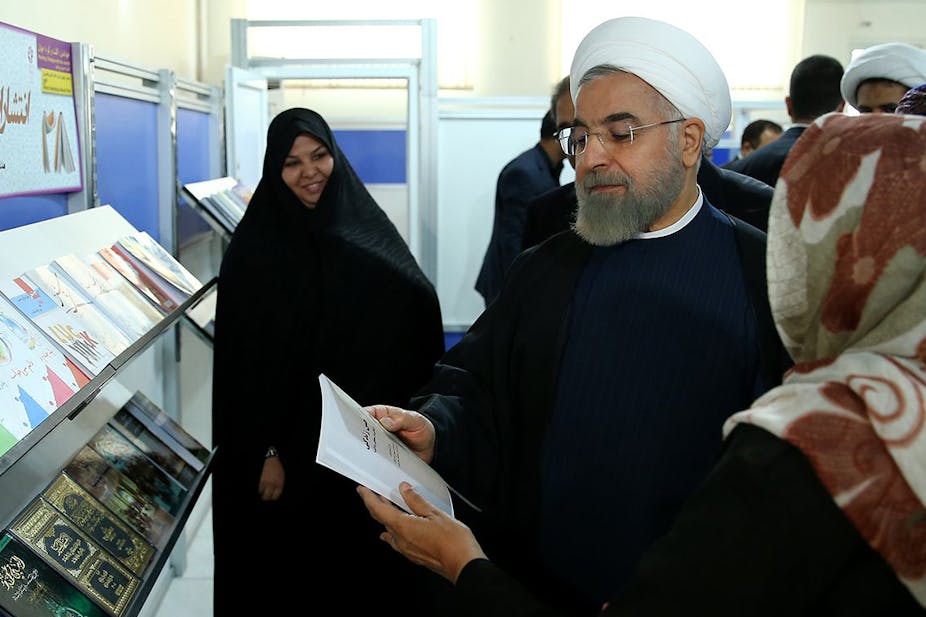Human rights watchdogs repeatedly shame Iran as one of the world’s worst offenders against freedom of expression, a harsh censor with little compunction about cracking down on critics with direct methods such as prior restraint and violent means of repression. But Iran, like other states around the world, is increasingly using other, more unorthodox ways of controlling speech – what might be called “indirect censorship”.
Instead of the classic methods of removing content wholesale or blocking access to it, indirect censorship methods make producing or accessing “undesirable” ideas and information costly, technically difficult or legally risky. They often do so via unrelated laws, or by bypassing weak or nonexistent protective regulations. Deployed by both governments and private actors, these methods often don’t fall under conventional definitions of censorship, and are therefore often not condemned as such.
The Iranian government is using indirect censorship partly out of geopolitical necessity. Tehran clearly wants to improve relations with the West, but the country’s domestic human rights situation is a major obstacle – and its attitudes to freedom of speech are a particular sticking point. Since the government is hardly inclined to fundamentally change its ways, it has come up with a typically neoliberal solution: to transfer responsibility for enforcing censorship to the private sector.
In a speech at Tehran’s 2016 International Book Fair, president Hassan Rouhani proposed that the ministry of Culture and Islamic Guidance hand its job of censoring books and cultural products to an association of writers and publishers. His government promoted this idea as an initiative to relax book censorship, and it was broadly accepted as such by the Western media. But because there are few clear regulations regarding censorship and a huge range of “sensitive” subjects, it would more likely have the opposite effect.
The plan is currently in its pilot stage, and if it becomes operational, the government will free itself from direct responsibility for book censorship. It would be left to publishers and writers themselves to enforce vague “red lines”, including upon themselves, lest they fall foul of a judiciary capable of seizing books after publication and inflicting paralysing financial damage.
This would inculcate a conservative culture of self-censorship, with writers and publishers desperate to avoid unbearable financial or legal consequences taking an even more cautious and strict approach than the government itself.
Burden of proof
Using unrelated laws to put pressure on media and to silence the dissidents is a typical method of indirect censorship. In Iran, defamation and insult lawsuits are an effective instrument with which to punish critics, and have a powerful and chilling effect on the media. And the way defamation laws are currently interpreted by the court means they can easily be used to restrict freedom of expression.
The Iranian legal system hosts two major approaches to dealing with defamation cases. The first, dominant until the Islamic Penal Code was introduced in 1983, considers that when someone attributes a specific crime to someone else, the accusations must be adjudicated by a court, and that if the accused is acquitted and considers themselves defamed, they may take their defamer to court in turn.
The other approach, which began to take hold in 1983, also allows someone claiming defamation to take their alleged defamer to court, but puts the burden of proof on the accuser. This violates the principle of presumption of innocence, and it puts particular pressure on investigative journalists who rely on anonymous or secret sources.

Worse still, according to an additional clause in the Islamic Penal Code’s article 697, allegedly defamatory statements can be punishable even when they are proven justified and true. This provision makes a useful pretext to crack down on any whistleblower or investigative journalist who reveals defensible evidence of the government’s corruption to the public.
A notorious case of this sort kicked off recently when the Iranian website Memari News published a set of official reports by the General Inspection Office that indicated that the Tehran Municipality had illegally transferred properties to a number of its high-ranking officers. Memari’s editor-in-chief, Yashar Soltani, was soon arrested and charged with defamation and “gathering classified information with the intent to harm national security”.
Even though the General Inspection Office confirmed the credibility of the documents and that the municipality was involved in the illegal transfer of public properties, Soltani remains on bail with his case open, and still stands accused of harbouring a hidden political agenda.
For now, the Iranian government is still using the same harsh methods of direct censorship for which it has long been known – blocking critical websites, for instance, or arresting government critics. But as it increasingly turns to more indirect methods, it is doing a better job of evading the scrutiny of the human rights watchdogs who’ve justifiably criticised it for so long.

